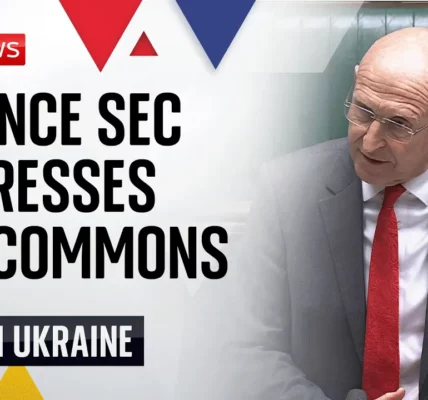Israel Kills Hamas Leader Yahya Sinwar: What Next for Gaza?

The death of Yahya Sinwar, one of the most wanted figures in the Israeli-Palestinian conflict, marks a pivotal moment in the ongoing war in Gaza. As Israel celebrates this significant military achievement, the future of the region hangs in the balance, raising questions about the potential for peace and stability amidst continuing violence.
Introduction
On October 7, 2022, a tragic series of events unfolded when Hamas launched a coordinated attack that resulted in the deaths of 1,200 Israelis. This marked the beginning of a long and turbulent year of conflict. A year later, on the anniversary of these attacks, Israeli forces succeeded in killing Yahya Sinwar, the leader of Hamas and a key architect of the initial attacks. This event has been hailed as a significant victory by Israeli leadership, but it raises pressing questions about the future of Gaza, the potential for a ceasefire, and the overall stability in the Middle East.
The Significance of Sinwar’s Death
Yahya Sinwar had been a central figure in Hamas since his rise to leadership in 2017. His death is seen as a crucial blow to the organization, but what does it truly mean for the ongoing conflict?
Background on Yahya Sinwar
Sinwar was initially imprisoned for over 20 years for his involvement in militant activities against Israel. Released in a prisoner exchange in 2011, he quickly rose through the ranks of Hamas, ultimately becoming its leader. His strategic planning and leadership were instrumental in orchestrating the October 7 attacks, which have been described as the most devastating in Israeli history since the Holocaust.
Immediate Reactions
The immediate aftermath of Sinwar’s death saw celebrations in Israel, with Prime Minister Benjamin Netanyahu declaring it a victory against evil. The United States echoed these sentiments, with President Biden and Vice President Harris praising the event as justice served and calling for a renewed push towards a ceasefire.
Implications for Hamas
Sinwar’s assassination raises critical questions regarding the future leadership of Hamas. With a significant figure removed, speculation arises about who will take his place and how this will impact the organization’s operational capabilities.
- Potential for internal power struggles within Hamas.
- Impact on the morale of Hamas fighters and supporters.
- Possibility of retaliatory attacks against Israeli forces.
What Happens Next in Gaza?
The killing of a high-profile leader like Sinwar could lead to a shift in tactics for both Hamas and Israeli forces. With the prospect of a ceasefire under discussion, what can we expect in the days and weeks to come?
Ceasefire Negotiations
Despite calls for a ceasefire from various international leaders, Netanyahu has remained firm about continuing military operations. This rejection of peace talks complicates the situation further and raises concerns about the humanitarian crisis unfolding in Gaza.
- Increased military operations by Israel in pursuit of remaining Hamas leaders.
- Continued suffering of civilians in Gaza amidst ongoing conflict.
- Potential for a more prolonged engagement in military actions.
Humanitarian Concerns
The humanitarian situation in Gaza remains dire, with reports of famine and severe shortages of essential supplies. International organizations are calling for urgent humanitarian aid to address the needs of the displaced and suffering population.
- Immediate need for food, water, and medical supplies.
- Challenges faced by NGOs in delivering assistance due to ongoing violence.
- The potential for increased displacement as military operations continue.
Regional Reactions and Future Prospects
Sinwar’s death does not occur in a vacuum but is rather a part of a larger geopolitical landscape. The regional responses and the actions of other militant groups, like Hezbollah, will play a significant role in shaping the future of the conflict.
Responses from Neighboring Countries
Countries neighboring Israel, including Lebanon and Iran, are closely monitoring the developments. Their responses could exacerbate tensions further:
- Hezbollah’s potential retaliation against Israeli forces.
- Iran’s ongoing support for militant groups in the region.
- The reaction of Palestinian factions in the West Bank and Gaza.
Long-term Impact on Peace Efforts
While the assassination of a leading figure might seem like a step towards victory for Israel, the broader question remains: can this pave the way for lasting peace? Historical precedents suggest that the removal of a leader does not necessarily lead to an end of hostilities.
Conclusion
The death of Yahya Sinwar marks a significant moment in the Israeli-Palestinian conflict, but it is not the end of the challenges facing the region. The potential for further violence looms, and the humanitarian crisis in Gaza demands immediate attention. As leaders call for a ceasefire, the international community must unite to bring about a sustainable resolution to the ongoing conflict. It is crucial for all stakeholders to engage in meaningful dialogue to ensure that the sacrifices made do not go in vain. The road to peace is fraught with obstacles, but it is a journey that must begin if hope for a better future is to be realized.
Read more about the ongoing conflict and potential resolutions.
“`




